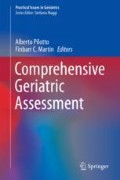Abstract
CGA is powerful. It encompasses a systematic approach to assessments, a patient-centred approach to goal setting and a collaborative team approach to both these plus treatment and follow-up. Standardised assessment tools and scales are useful, but it is important to understand their best uses and their potential for abuse. Different systems of scaling require different approaches to interpretation and statistical analysis. Within the overarching notion of CGA are included less intense assessments such as screening tools and broad and deep intensive assessments as are needed for many clinical encounters in acute care and long-term care. Tools which are useful for screening will not be sufficiently explanatory for care planning. CGA lends itself to the development of clinical prediction tools which can inform service design, explain causative relationships and sometimes help individual clinical decision-making. But caution is needed in the application of these tools in contexts in which they were not developed. The impact of CGA on clinical and service outcomes depends on the skills and composition of clinical teams and how effectively they work together. Experience and empirical research has helped an understanding of how to achieve optimal collaboration.
References
Mokkink LB, Terwee CB, Patrick DL, Alonso J, Stratford PW, Knol DL, Bouter LM, de Vet HCW (2010) The COSMIN checklist for assessing the methodological quality of studies on measurement properties of health status measurement instruments: an international Delphi stud. Qual Life Res 19(4):539–549
Terwee CB, Mokkink LB, Knol DL, Ostelo RW, Bouter LM, de Vet HC (2012) Rating the methodological quality in systematic reviews of studies on measurement properties: a scoring system for the COSMIN checklist. Qual Life Res 21(4):651–657. doi:10.1007/s11136-011-9960-1
Sullivan Pepe M, Janes H, Longton G, Leisenring W, Newcomb P (2004) Limitations of the odds ratio in gauging the performance of a diagnostic, prognostic, or screening marker. Am J Epidemiol 159:882–890. doi:10.1093/aje/kwh101
Debray TPA, Damen JAAG, Snell KIE, Ensor J, Hooft L, Reitsma JB, Riley RD, Moons KGM (2017) A guide to systematic review and meta-analysis of prediction model performance. BMJ 356:i6460. doi:10.1136/bmj.i6460
Moons KGM, de Groot JAH, Bouwmeester W et al (2014) Critical appraisal and data extraction for systematic reviews of prediction modelling studies: the CHARMS checklist. PLoS Med 11:e1001744. doi:10.1371/journal.pmed.1001744
Korner M (2010) Interprofessional teamwork in medical rehabilitation: a comparison of multidisciplinary and interdisciplinary team approach. Clin Rehabil 24(8):745–755
American Geriatrics Society (2015) Care Coordination. Available from: http://www.americangeriatrics.org/advocacy_public_policy/care_coordination/. Accessed 7 Apr 2017
Further Reading
Debray TPA, Vergouwe Y, Kpoffijberg H, Nieboer D, Steyerberg EW, Moons KGM (2015) A new framework to enhance the interpretation of external validation studies of clinical prediction tools. J Clin Epidemiol 68:279–289
Mokkink LB, Prinsen CA, Bouter LM, Vet HC, Terwee CB (2016) The COnsensus-based standards for the selection of health measurement instruments (COSMIN) and how to select an outcome measurement instrument. Braz J Phys Ther 20(2):105–113. doi:10.1590/bjpt-rbf.2014.0143
Steyerberg EW, Moons KGM, van der Windt DA et al (2013) PROGRESS group. Prognosis research strategy (PROGRESS) 3: prognostic model research. PLoS Med 10:e1001381. doi:10.1371/journal
Author information
Authors and Affiliations
Corresponding author
Editor information
Editors and Affiliations
Rights and permissions
Copyright information
© 2018 Springer International Publishing AG
About this chapter
Cite this chapter
Martin, F.C. (2018). The Patient, the Multidisciplinary Team and the Assessment. In: Pilotto, A., Martin, F. (eds) Comprehensive Geriatric Assessment. Practical Issues in Geriatrics. Springer, Cham. https://doi.org/10.1007/978-3-319-62503-4_3
Download citation
DOI: https://doi.org/10.1007/978-3-319-62503-4_3
Published:
Publisher Name: Springer, Cham
Print ISBN: 978-3-319-62502-7
Online ISBN: 978-3-319-62503-4
eBook Packages: MedicineMedicine (R0)

